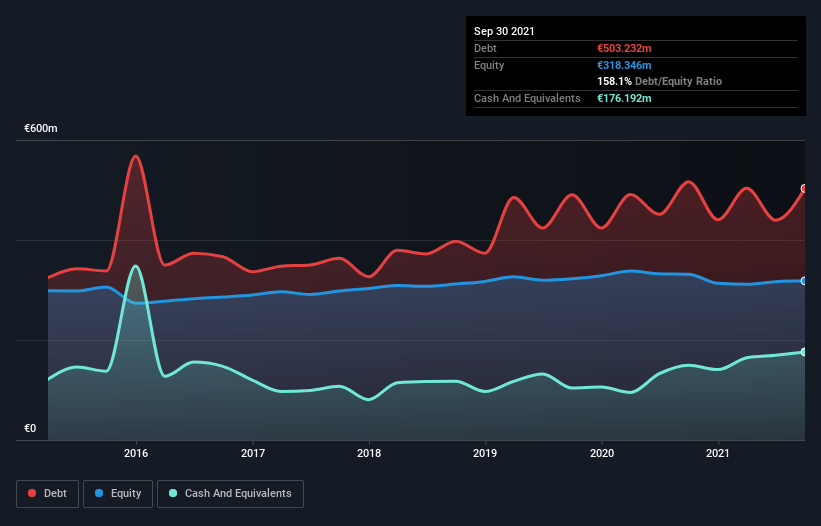Howard Marks put it nicely when he said that, rather than worrying about share price volatility, 'The possibility of permanent loss is the risk I worry about... and every practical investor I know worries about.' So it might be obvious that you need to consider debt, when you think about how risky any given stock is, because too much debt can sink a company. As with many other companies IVS Group S.A. (BIT:IVS) makes use of debt. But the real question is whether this debt is making the company risky.
When Is Debt A Problem?
Generally speaking, debt only becomes a real problem when a company can't easily pay it off, either by raising capital or with its own cash flow. Part and parcel of capitalism is the process of 'creative destruction' where failed businesses are mercilessly liquidated by their bankers. However, a more common (but still painful) scenario is that it has to raise new equity capital at a low price, thus permanently diluting shareholders. Of course, plenty of companies use debt to fund growth, without any negative consequences. The first thing to do when considering how much debt a business uses is to look at its cash and debt together.
Check out our latest analysis for IVS Group
How Much Debt Does IVS Group Carry?
As you can see below, IVS Group had €503.2m of debt, at September 2021, which is about the same as the year before. You can click the chart for greater detail. However, it also had €176.2m in cash, and so its net debt is €327.0m.

A Look At IVS Group's Liabilities
According to the last reported balance sheet, IVS Group had liabilities of €171.3m due within 12 months, and liabilities of €474.0m due beyond 12 months. Offsetting these obligations, it had cash of €176.2m as well as receivables valued at €35.1m due within 12 months. So it has liabilities totalling €434.1m more than its cash and near-term receivables, combined.
This deficit casts a shadow over the €174.5m company, like a colossus towering over mere mortals. So we'd watch its balance sheet closely, without a doubt. After all, IVS Group would likely require a major re-capitalisation if it had to pay its creditors today. When analysing debt levels, the balance sheet is the obvious place to start. But ultimately the future profitability of the business will decide if IVS Group can strengthen its balance sheet over time. So if you're focused on the future you can check out this free report showing analyst profit forecasts.
In the last year IVS Group had a loss before interest and tax, and actually shrunk its revenue by 6.3%, to €342m. We would much prefer see growth.
Caveat Emptor
Over the last twelve months IVS Group produced an earnings before interest and tax (EBIT) loss. To be specific the EBIT loss came in at €587k. When we look at that alongside the significant liabilities, we're not particularly confident about the company. It would need to improve its operations quickly for us to be interested in it. It's fair to say the loss of €13m didn't encourage us either; we'd like to see a profit. In the meantime, we consider the stock to be risky. The balance sheet is clearly the area to focus on when you are analysing debt. But ultimately, every company can contain risks that exist outside of the balance sheet. For instance, we've identified 2 warning signs for IVS Group (1 makes us a bit uncomfortable) you should be aware of.
At the end of the day, it's often better to focus on companies that are free from net debt. You can access our special list of such companies (all with a track record of profit growth). It's free.
New: AI Stock Screener & Alerts
Our new AI Stock Screener scans the market every day to uncover opportunities.
• Dividend Powerhouses (3%+ Yield)
• Undervalued Small Caps with Insider Buying
• High growth Tech and AI Companies
Or build your own from over 50 metrics.
Have feedback on this article? Concerned about the content? Get in touch with us directly. Alternatively, email editorial-team (at) simplywallst.com.
This article by Simply Wall St is general in nature. We provide commentary based on historical data and analyst forecasts only using an unbiased methodology and our articles are not intended to be financial advice. It does not constitute a recommendation to buy or sell any stock, and does not take account of your objectives, or your financial situation. We aim to bring you long-term focused analysis driven by fundamental data. Note that our analysis may not factor in the latest price-sensitive company announcements or qualitative material. Simply Wall St has no position in any stocks mentioned.
About BIT:IVS
Proven track record with limited growth.
Market Insights
Community Narratives



